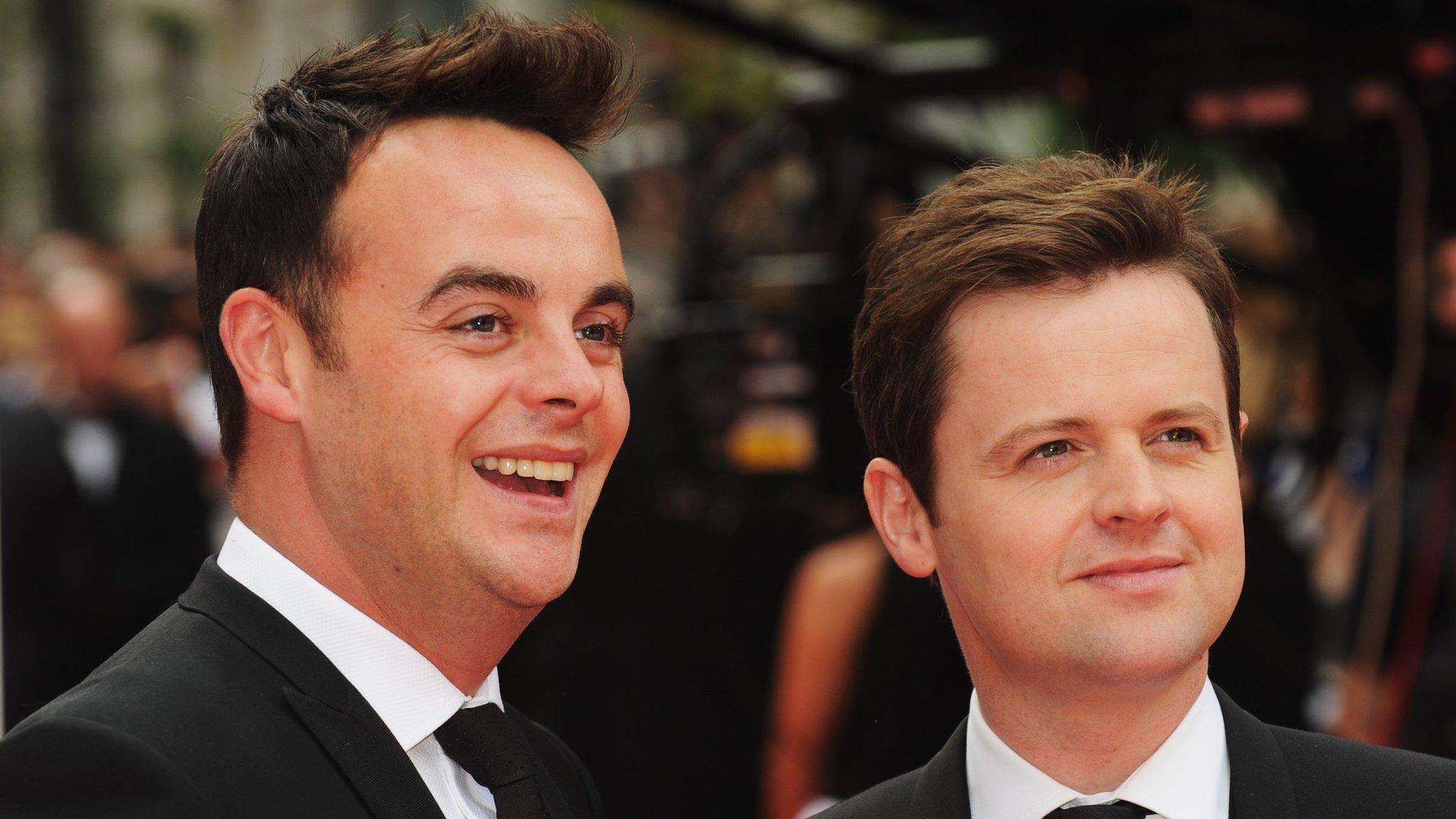Ant & Dec: The secret of their success
- Published
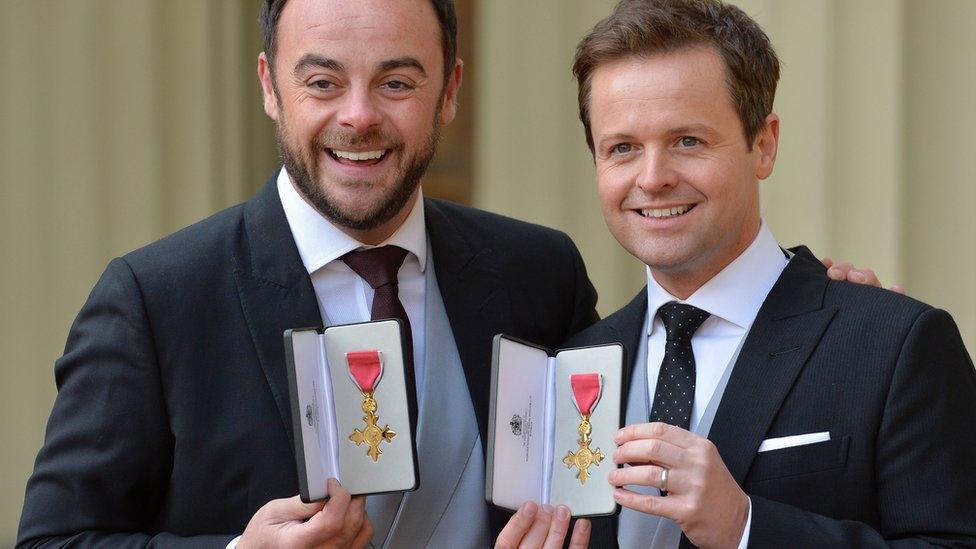
The pair were honoured for services to broadcasting and entertainment
The nation's favourite TV duo Ant and Dec were given the royal seal of approval today when they were awarded OBEs for services to broadcasting and entertainment by the Prince of Wales at Buckingham Palace.
Earlier this week they scooped three prizes at the National Television Awards, including best TV presenter for the 16th year in a row.
But why do we love these cheeky chums so much? What's the secret behind the unstoppable rise of these side-splitting sidekicks?
Best friends
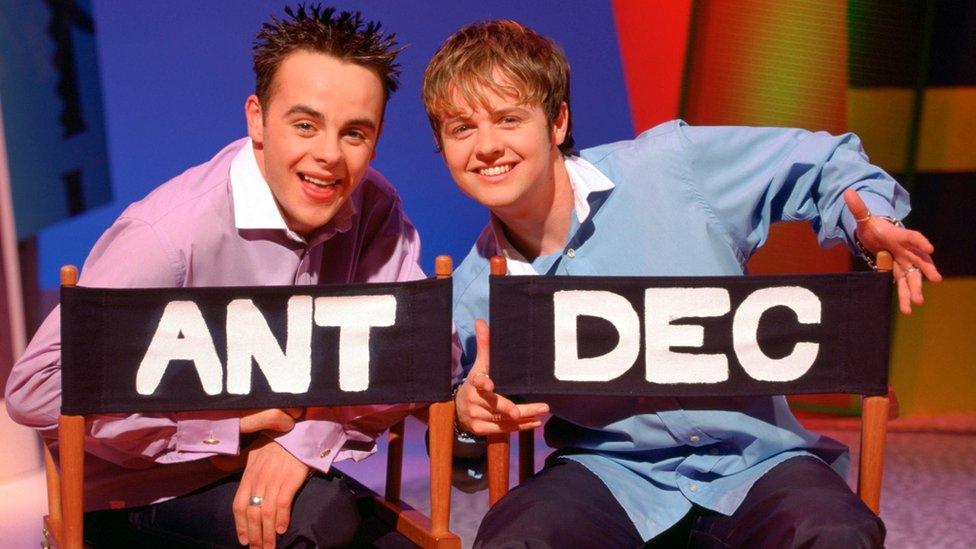
The duo's first presenting job was on CBBC's The Ant & Dec show in 1995
TV producer Conor McAnally witnessed the transformation of Ant and Dec from success-hungry teenagers to grown-up lovable comrades. He saw instant potential in the two when they took on their first proper presenting gig on The Ant & Dec Show in 1995 on CBBC.
"As a producer, you're looking for that spark in a new presenter," says McAnally. "Someone who can reach through the camera and grab an audience. Presenting skills, technical skills, hitting your marks, all that sort of stuff is less important in the initial stages because all that can be trained.
"But with Ant and Dec there was a symbiosis. They were each other's genuine best friend. They each thought the other was the funniest guy in the world. They wanted to hang out all the time, even off camera. You can't fake that.
"These guys could dance, they could sing, they could act, and they could talk to the camera like it was their best friend."
On screen camaraderie
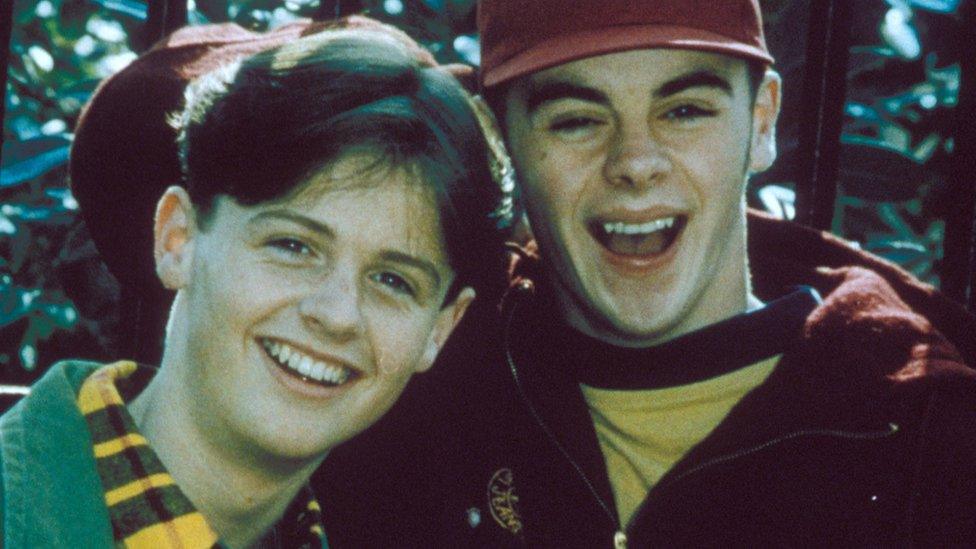
They got their first break in 1989 on children's drama Byker Grove. Unusually, Dec is on the left in this picture
It's Ant and Dec's uncanny knack for talking directly to their audience that lies behind their genius. To many, it feels like watching friends rather than frontmen.
Thick Geordie accents have helped to forge this bond with viewers - in a 2010 survey by call centre managers Sitel, Geordie was found to be the UK's friendliest dialect.
"They seem so natural and so off the cuff, but most people don't know that is because they work very, very hard," McAnally continues. "Their early training as actors meant they really studied their scripts.
"Beyond that, they really go down in to the essence of the show. What's it about? What's their role in it? What are they bringing to the audience? They're both great students of entertainment television."
Behind the seemingly effortless on screen camaraderie lies an unparalleled understanding of TV expertise, believes McAnally.
"They're both really canny business guys. They understand their value. They understand the business end of television and rights and royalties and the value of the shows they've done. They're sometimes very tough negotiators."
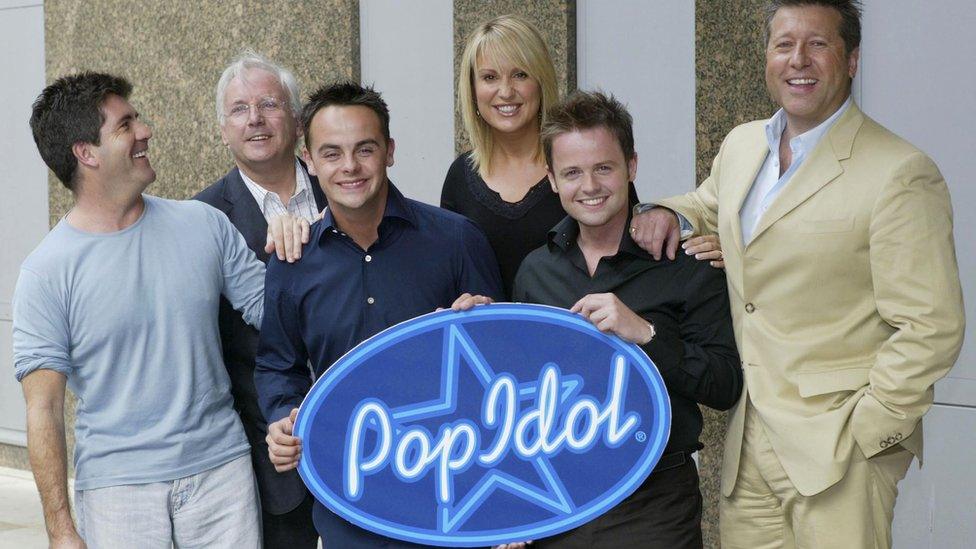
Ant and Dec also fronted Pop Idol from 2001-03, which brought back talent shows to prime time TV
While Ant and Dec have mastered being front of the camera, they also perfected the art of being behind it.
Over the years the pals struck numerous lucrative TV rights deals through their production companies Gallowgate, which they sold in 2012, and Mitre, launched in 2013.
As rights holders for many of their productions, in 2015 they pocketed a reported £1m per episode to license Saturday Night Takeaway to US networks.
The series bombed across the pond - perhaps because its host Neil Patrick Harris couldn't recreate the Geordie duo's mischievous magic - but it didn't stop them netting a cool £15m by the time the series was axed, contributing to their total net worth of around £62m.
Leave 'em wanting more
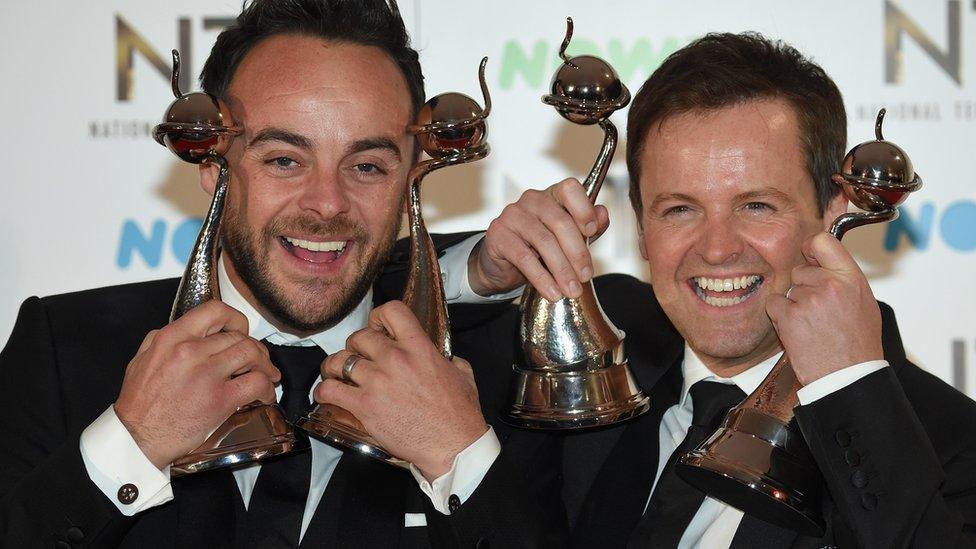
Ant & Dec have won the best TV presenter prize at the National Television Awards for 16 consecutive years
It's this TV prowess which has prevented Ant and Dec from becoming over saturated, despite having touched almost every audience demographic.
Today, their three biggest shows - I'm a Celebrity Get Me Out Of Here!, Saturday Night Takeaway and Britain's Got Talent - each run for short bursts at a time, with gaps in between long enough to leave audiences wanting more.
Perhaps Ant and Dec's biggest appeal is that they seem at home on screen. We've watched them grow up and adapt to the challenges of 21st Century television.
"As people they became more and more confident and comfortable with being Ant and Dec," says McAnally. "When I started working with them on The Ant & Dec Show, they had been PJ and Duncan.
"It was a transition period when they went from playing characters on television to playing themselves, but they tackled that head on. Each new show brought new challenges and new opportunities to expand what they could do on screen."
Not every challenge resulted in new opportunities of course, but the pair have taken each bump on the road to stardom with grace and humility.
Most notably, their 2008 attempt to bring gameshow Wanna Bet? to US audiences was branded "unintelligible", external by critics. It was cancelled after six episodes due to issues with viewers being unable to understand the duo's Geordie accents as well as the dull format.
The future
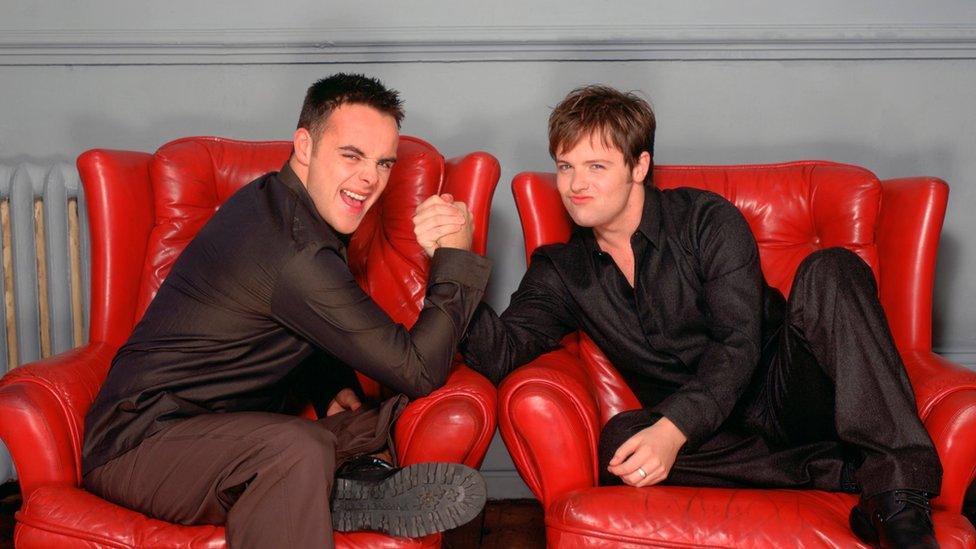
The pair signed a new three-year deal with ITV in November
After The Ant & Dec Show, McAnally went on to produce five more shows with the pair - Ant & Dec Unzipped, Slap Bang, Friends Like These, CD:UK and SMTV. But it wasn't always plain sailing.
"There were moments where I wondered whether they would stick together. It happens a lot with duos, because working together over extended periods of time inevitably leads to conflict.
"They both had slightly different ambitions, but they both understood that their friendship was bigger than anything, and that working on their own wasn't as fun. It was a case of one plus one makes four, not two."
In November, the Geordie duo signed a new deal with ITV rumoured to be worth £40m which will see them stay exclusively with the channel for another three years. So there's no chance of them slipping off our TV screens any time soon.
McAnally concludes: "There might be better presenters out there in a technical sense, but they absolutely deserve every single award they get, because no one else has ever gotten in to the hearts of the UK population like Ant and Dec."

Follow us on Facebook, external, on Twitter @BBCNewsEnts, external, or on Instagram at bbcnewsents, external. If you have a story suggestion email entertainment.news@bbc.co.uk, external.
- Published25 January 2017
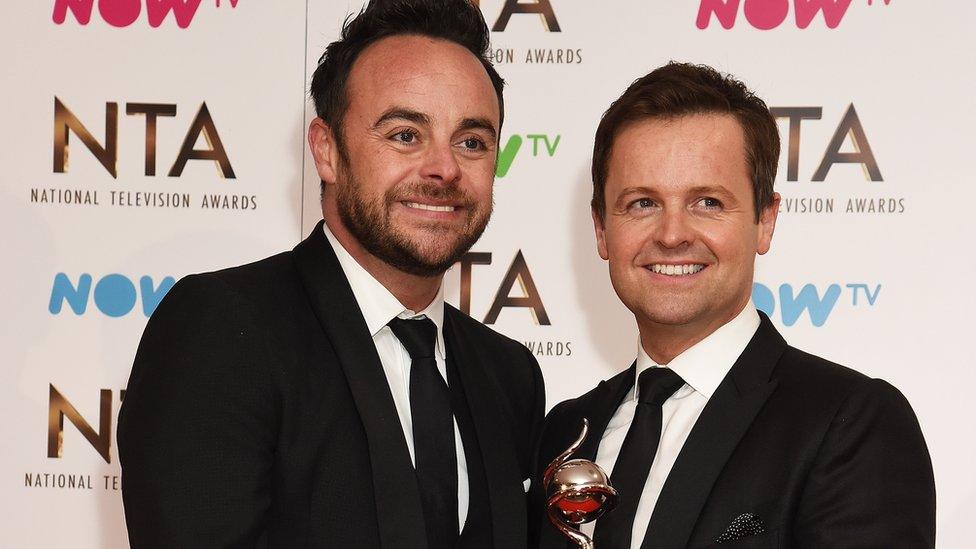
- Published14 November 2016
